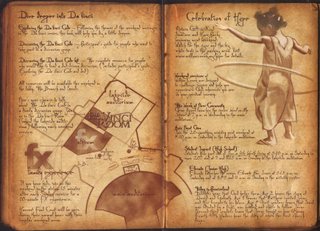
Here's another one you can dance to. I don't think I ever heard it before yesterday, and I have no idea why. Malachy and I have been going "Shake! Shake!" ever since we heard it!

I'm a Midwesterner married to a Southerner, raising a family in Las Vegas and appreciating the beauty along the way!



If that last video explains what endeared them so quickly to the gay club scene than this one explains what endeared them to the rest of the world.

God tells His newly minted man and woman that they rule over world and its creatures, including, as the King James puts it—"every creeping thing that creepeth upon the earth." What a superb phrase! It's perfect for insects, terrorists, and children.
"He's the real deal," Warren says. "He knows what he's talking about. Bono understands what I call 'the stewardship of affluence and influence,' in that God does not give us either money or fame for our own ego. But we're to use it. It's a stewardship. And I love the way that he's leveraging the fame that he has — for good."

Adam:
He let the Times fall to the carpet beside him. It was the usual recital - a new tax plan, the danger of oral contraceptives to women over forty, the mayor's special committee on child abuse. He pushed his glasses back on his forehead and with his thumb and forefinger massaged the loose flesh under his eyes. Through the club window he could see a woman in slacks waiting for a bus, a boy with a pony tail walking a dog. Sombody had the TV on in another room, and he could hear the rise and fall of canned laughter. He lit a cigarette and let the smoke drift out of his mouth without exhaling it. The city sky was turning brown with the approach of dusk. Then suddenly, as if it has been only yesterday, he remembered Eden.
The leopard...the starling...the rose - he rememberd giving each its name, remembered the green river, the shy, green girl. He could no longer remember why it was he had felt compelled to leave it except that it had something to do with asserting his independence. Beyond that, he had only the dim sense that somehow a terrible injustice had been done, or possibly a terrible justice.
He saw the flame of what must have been the sunset flash like a sword in the upper story windows across the street. When the old steward brought him his third martini, he called him Pete. Actually, his name was Angelo.
(Genesis 2-3)
Agrippa:
There's something a little sad about seeing anybody for the last time, even somebody you were never particularly crazy about to begin with. Agrippa, for instance. He was the last of the Herods and after him that rather unsavory dynasty came to an end.
When Saint Paul was on his way to Rome to stand trial, King Agrippa granted him a preliminary hearing, and Paul, who was seldom at a loss for words, put up a strong defense. He described how on the road to Damascus he had come to believe Jesus was the Messiah and how all he had been doing since was trying to persuade other people to believe he was right. He said the fact the Jews were out to get him showed only that they didn't understand their own scriptures because the whole thing was right there including the prediction that the Messiah would suffer and rise from the dead just the way Jesus had.
After he finished, Agrippa came out with the only remark he ever made that has gone down in history. "Almost thou persuadest me to become a Christian," he said (Acts 26:28).
Almost is apt to be a sad word under the best of circumstances, and here, on the lips of the last of his line the last time you see him it has a special poignance. If only Paul had been a little more eloquent. If only Agrippa had been a little more receptive, a little braver, a little crazier. If only God weren't such a stickler for letting people make up their own minds without coercing them. But things are what they are, and almost is the closest Agrippa ever got to what might have changed his life. It's sad enough to miss the boat at all, but to miss it by inces, with a sainnt right there to hand you aboard, is sadder still.
(Acts 26:1-28 KJV)


Willow Creek, like many evangelical churches around the country, is in the midst of running a multiweek series of Bible studies based on "Da Vinci." The first two Sunday services in the series drew more than 44,000 people [combined attendance], church spokeswoman Cally Parkinson said.
"There's a huge response to this thing, and churches are really seeing this as an opportunity to turn what has wrought so much ill, for good," Strobel said. "There is a segment that wants to boycott, picket and protest. But I turn to Paul in Acts 17, who comes to Athens where [the people] are idol worshipping, and he's pissed off and wants to smash the idols. But instead, he engages them.
"[St. Paul] quotes their books to them! He's read their books! He'd seen their movies, so to speak, and he's speaking their language. So he reasoned with them and used it as a bridge to bring them the gospel. So that's what I'm hoping people do."
The evangelical Christian community's passion for movies is of a recent vintage, said Mark Noll, co-founder of the Institute for the Study of American Evangelicals at Wheaton College, who is widely considered the leading historian of American evangelicals.
Since the massive success of "The Passion of the Christ" -- based in no small part on the support it received from evangelical Christians -- evangelical Christian billionaire Philip Anschutz's "family-oriented" film company, Walden Media, had a smashing success with "The Chronicles of Narnia: The Lion, the Witch, and the Wardrobe," which it co-produced with Disney.
"The Polar Express," "Gods and Generals" and, most recently, "Flight 93," all have been marketed toward an evangelical audience.
"By way of a long historical comparison, there certainly is just an assumption that it's appropriate to be active in this medium, or about this medium, and that certainly wasn't there before," Noll said.
As recently as the 1950s, most evangelical Christians were decidedly anti-movies, he said. Wheaton College, an evangelical institution, only has allowed its students to watch movies since the late 1960s.
May we be women who acknowledge our power to change, and grow, and be radically alive for God.
May we be healers of wounds and righters of wrongs.
May we weep with those who weep and speak for those who cannot speak for themselves.
May we cherish children, embrace the elderly, and empower the poor.
May we pray deeply and teach wisely.
May we be strong and gentle leaders.
May we sing songs of joy and talk down fear.
May we never hestiate to let passion push us, conviction compel us, and righteous anger energize us.
May we strike fear into all that is unjust and evil in the world.
May we dismantle abusive systems and silence lies with truth.
May we shine like stars in a darkened generation.
May we overflow with goodness in the name of God and by the power of Jesus. And in that name, and by that power, may we change the world.
Dear God, please make us dangerous women, Amen.
Now, with the apologies offered and the buzz faded from an HIV conference that Saddleback hosted for 1,700 Christian pastors in December, two-time cancer survivor Kay Warren is tackling the grunt work behind the promises made that day. And Rick Warren has taken a supportive backseat.
....
In many ways, she said, it has been easier to help people with HIV in Africa -- because other evangelicals have been trying to make inroads there for a couple of years -- than to reach out to those just a few miles away. She has found herself caught in the middle of the nation's widening cultural gap between conservative Christians and nonevangelicals.
Fellow evangelicals are upset with her frank discussions of sexuality and advocacy of condom use. On the other end, some secular HIV care providers are wary of Saddleback's motives.
...
Fleming [program manager for Orange County's HIV Planning and Coordination office] suggested that there probably wouldn't be much resistance from skeptical HIV care providers if Saddleback volunteers wanted to do things like stock food pantries, where they would be less likely to be in contact with people with HIV.
Warren said Saddleback members are willing to stock shelves, but she doesn't want church members to be isolated from people with HIV. The point of Saddleback's HIV ministry -- or Care Teams, as the church calls them -- to is to interact with the sick and their families at their time of need, and literally hold their hands.
 It's the very typical, familiar version of You Are Worthy of My Praise...until these two dudes step up and start jammin' their brains out. Especially the guy in white, his moves would shame a man half his age!
It's the very typical, familiar version of You Are Worthy of My Praise...until these two dudes step up and start jammin' their brains out. Especially the guy in white, his moves would shame a man half his age!
Though angry [about the errors in the book], Christian leaders say they have nothing to gain by organizing pickets outside movie theaters. That would make them look closed-minded and defensive, when what they really need to counter the power of the film is "a very positive, wholesome, winsome" response, said Josh McDowell, a Christian writer and evangelist in Richardson, Texas.
Besides, "it's probably going to be an awesome movie," said Garry Poole, a pastor at Willow Creek Community Church near Chicago. Poole drew 22,000 to a sermon about "The Da Vinci Code" last month. He hopes that those who came for the sport of hearing a minister take on a bestseller will return this Sunday for another round. Over time, he hopes they will find truth and comfort in the church and develop an abiding faith.
In recent years, evangelical pastors have shied away from such dense sermons, preferring to preach practical self-help messages instead. "The Da Vinci Code" has prompted a renewed interest in basic theology — to many scholars' delight.
What do you think the popularity of The Da Vinci Code reveals about pop culture attitudes toward Christianity and the church?
Brian McLaren: I think a lot of people have read the book, not just as a popular page-turner but also as an experience in shared frustration with status-quo, male-dominated, power-oriented, cover-up-prone organized Christian religion. We need to ask ourselves why the vision of Jesus hinted at in Dan Brown's book is more interesting, attractive, and intriguing to these people than the standard vision of Jesus they hear about in church. Why would so many people be disappointed to find that Brown's version of Jesus has been largely discredited as fanciful and inaccurate, leaving only the church's conventional version? Is it possible that, even though Brown's fictional version misleads in many ways, it at least serves to open up the possibility that the church's conventional version of Jesus may not do him justice?So you think The Da Vinci Code taps into dissatisfaction with Jesus as we know him?
McLaren: For all the flaws of Brown's book, I think what he's doing is suggesting that the dominant religious institutions have created their own caricature of Jesus. And I think people have a sense that that's true. It's my honest feeling that anyone trying to share their faith in America today has to realize that the Religious Right has polluted the air. The name "Jesus" and the word "Christianity" are associated with something judgmental, hostile, hypocritical, angry, negative, defensive, anti-homosexual, etc. Many of our churches, even though they feel they represent the truth, actually are upholding something that's distorted and false.I also think that the whole issue of male domination is huge and that Brown's suggestion that the real Jesus was not as misogynist or anti-woman as the Christian religion often has been is very attractive. Brown's book is about exposing hypocrisy and cover-up in organized religion, and it is exposing organized religion's grasping for power. Again, there's something in that that people resonate with in the age of pedophilia scandals, televangelists, and religious political alliances. As a follower of Jesus I resonate with their concerns as well.

 Last week we started the weekend series on The DaVinci Code. Not many series offer such rich inspiration to the various types of artists that put together a program.
Last week we started the weekend series on The DaVinci Code. Not many series offer such rich inspiration to the various types of artists that put together a program.  Gothic arches, faux stained glass windows, renaissance art, classical music... it was like walking into a different church this weekend.
Gothic arches, faux stained glass windows, renaissance art, classical music... it was like walking into a different church this weekend.

 You don't often hear spontaneous applause in the middle of history lectures, which was what this was, most of the time.
You don't often hear spontaneous applause in the middle of history lectures, which was what this was, most of the time.